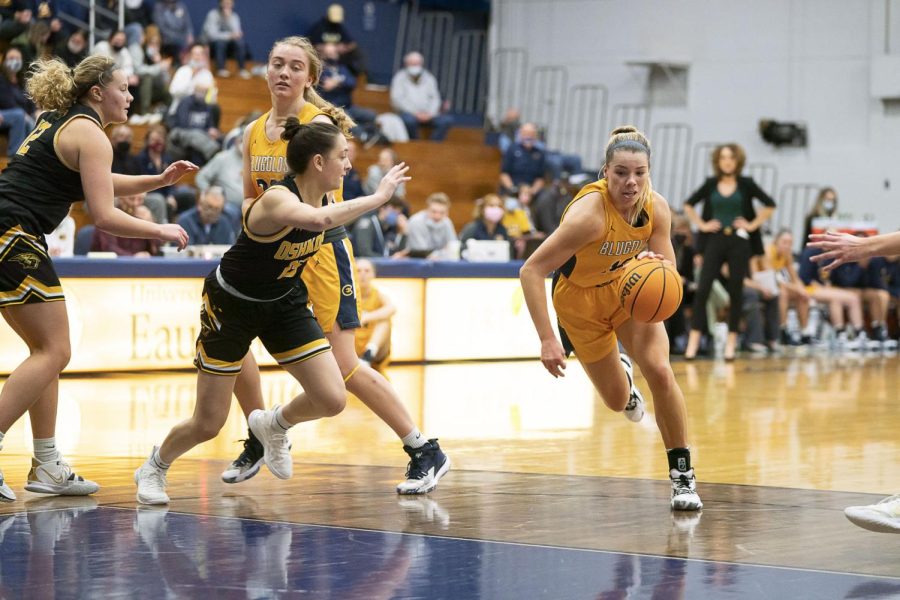 David Taintor
David TaintorThe printing press.
Television.
iPods and MP3 players.
Technology never stops, and those are only a few examples.
Most recently, or rather, a long time ago in technology time, people have had the opportunity to carry a library with them without worrying about the weight and the muscle pain – the wireless reading device.
What is it?
One example of the wireless device, the Kindle, entered the world of technology three years ago, according to Amazon.com.
The Kindle offers a wireless connection for easy download, a high resolution screen that resembles paper and weighs less than a typical paperback – 10.3 ounces. It also has the capacity to hold over 200 titles, which is more than the typical paper book.
The older Kindle needed to be recharged every other day if using wireless Internet. Without wireless, the battery could last for a week or more before recharging.
Since then, Amazon introduced the newest version of the wireless device – the Kindle 2. Released on Feb. 23, 2009, the newest chapter of Kindle technology weighs less, allows more storage and has increased battery life. One of the new features even allows the Kindle 2 to read to the reader.
In addition to the Kindle, there are similar types of wireless reading devices offered by other companies.
Technology never stops. But how long before it reaches the UW-Eau Claire campus?
At the library
At his previous job (a public university library), Bryan Vogh, head of systems at McIntyre Library, said they considered getting Kindles and allowing students to check them out.
Unfortunately, public universities have problems with the reading device, Vogh said.
“(The university) model that they have requires that you have an account set up, usually on your credit card,” he said. “Because of the way universities set up their requirements for their credit cards, you can’t have that kind of limited access.”
In addition, Vogh said there is no guarantee that people who check out a Kindle would not buy a bunch of materials and then not read it.
“It could potentially be very wasteful,” he added.
Vogh said the consensus in the library world is that while the Kindle is great, it doesn’t fit with the model most libraries use in terms of getting materials and making them available because the digital rights management and the model for buying is kind of problematic.
“But as a user, I think it’s kind of a neat idea in some ways to be able to carry around that many books,” he said.
Even though the Kindle seems out of the question, Vogh said the library has considered going completely digital. However, it’s a difficult proposition for a number of reasons.
“What do you read them on?” Vogh said. “How do you do a length of loan? Where is the item actually stored?”
Vogh added that if a book is bought, it can be stored on a shelf. But with electronic items, storage, maintenance costs, organization and server space play a factor.
Currently, Vogh said there are about 12,000 electronic books available at the university.
Vogh said he thinks the Kindle (or technology like it) still has a while to go before it is instituted in universities.
“The problem is, we have these 12,000 items that are electronic,” he said. “If we can’t get those onto it . it’s not really helping you access our collection . you really want something that’s going to integrate all the things that the library has together.”
At the bookstore
Ah, Eau Claire, the home of the rental textbook. But are digital textbooks in the future?
Charles Farrell, director of University Centers, said the idea of a digital textbook has never been discussed for the university. Also, the university does not offer any digital textbooks that he knows of.
Farrell said he thinks the technology is not mainstream and does not know how it might evolve. At some time, he said it could perhaps work.
“(But) it’s certainly not something we’re planning to do tomorrow,” he said.
Like any technology, Farrell said the wireless reading device technology is fairly expensive because it is so new. If the university were to consider it, he said they would have to know what the costs were and how it works.
Despite the potential for the Kindle, Farrell said he does not think Kindles will ever replace books because books are a technology that continues to work.
“I think it would have to be seen as cheaper . more convenient and more useful,” he said.
“I think until it’s a technology that shows itself superior to books, I don’t know that we would spend a lot of time on it right now,” he said.
For the students
Junior Aimee Lemay said she wouldn’t like a Kindle for herself because she still prefers to hold a real book. But that doesn’t lessen the Kindle’s appeal and causes mixed feelings for Lemay.
“I think they’re pretty fascinating that they can hold all that information,” she said. “But I guess it’s good because you have your whole library.”
Lemay said she thinks a device like this would be good for college students because it could hold all their textbooks.
However, Vogh said it might not be possible for students using a Kindle to get the specific types of textbooks needed unless they’re the proper format. He added that people could request that Amazon make certain books available on the Kindle.
Lemay said because of the price, she would consider buying one if needed, but it would not be at the top of her priority list. But she thinks someday the Kindle will become like its musical counterpart, the iPod.
“I think eventually down the line, yes,” she said. “But not in the near future.”





